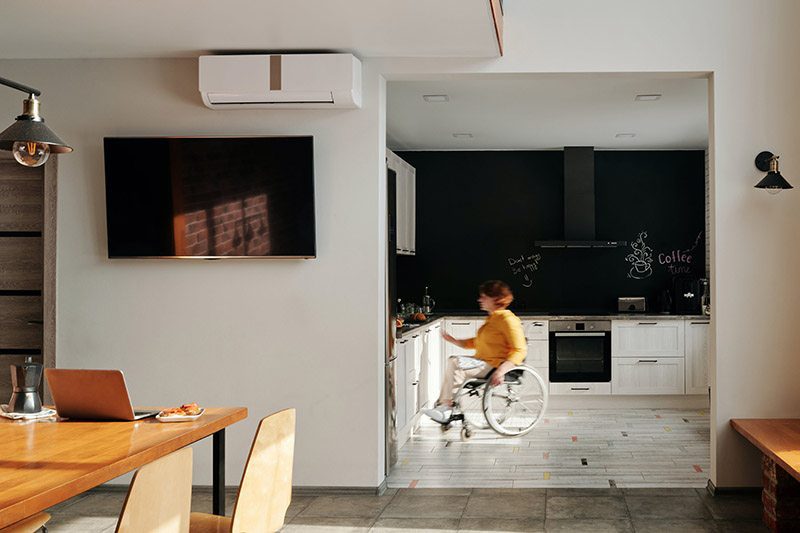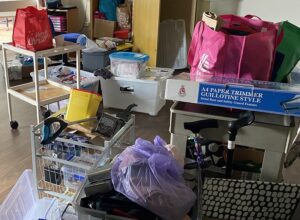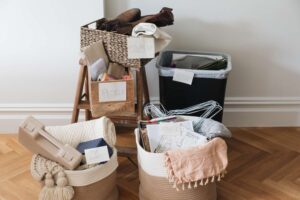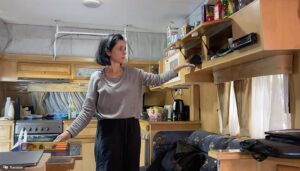
Organising for people with disability and illness
Organising in general, is not a one-size-fits-all practice, and neither is organising for people with disability and illness. But here are some things to consider.
Declutter
Having piles of unnecessary items on floors and benchtops will make it harder to access what you need. This is important for everyone, but particularly if you have impacted mobility, dexterity or cognitive function. Get rid of anything you don’t need or love. And be wary of acquiring lots, as this will affect your space.
Organise
Hierarchise your stuff based on importance so you can make what’s important for you, easily accessible for you. It’s a tailored approach. If it’s not properly considered, you won’t be able to reach items or put them away – meaning the space will become increasingly dysfunctional and disorderly.
Ideally, your home has been or will be structurally modified for access and independent living to the extent that’s practical. Benches lowered, power points raised, ramps installed and lots more. Some companies specialise in this. Look into NDIS funding if applicable.
But you need to go one step further and consider how your belongings are stored. Professional Organisers talk about maximising prime real estate for frequent-use items, but we also acknowledge that everyone’s prime zone is different. If you are in a walker or wheelchair, you will require a lower access range.
Some organising tools are easy to deploy or purchase, for example:
- Are your shelves adjustable? If so, minimise wasted space by adjusting the prime shelving to be as close together as possible. Cereal boxes don’t need to stand up!
- If not or in certain circumstances, mini-shelves can double-layer some shelving areas. You can also adhere hooks and racks to the inside of your pantry and other doors. Kmart and other stores have lots of products.
- Turntables can reach deep cupboards and bring everything into reach. Splash out and get some good-quality ones that can bear some weight. The cheapies don’t achieve much.
Consider new ways to store items. Rather than high shelves, blankets can be folded over the back of the couch for easy access. A hollow ottoman may be more convenient than a tall bookshelf for games and books.
Tall shelves are still great for items you love but don’t need. Ornaments and keepsakes for example.
Furniture may be best arranged against the walls, and their contents grouped according to use, to minimise unnecessary miles across the floor space to do daily tasks.
If you have the luxury of space, a spare bedroom could become a storeroom for occasional items and backup supplies.
Think about your reaching distance. Deep desks and benches are not ideal – or could you use a Reacher Grabber Tool?
Other considerations
If you are bedridden, your daily needs should be met within arm’s reach. In this case, prioritising your necessary daily items is crucial.
Consider the availability of home help – can someone else help with tasks, and if so how often? This will determine what, if anything could be put in harder-to-reach zones.
Technology can be beneficial via voice command lights, blinds and doors.
Organising for people with disability and illness may require factoring in mental and physical fatigue, in which case shorter bursts of organising are advisable, and easy maintenance is important. You don’t have to reorganise the entire house in one session. Decluttering just one item a day is great.
If burnout is real, save energy where you can. Outsource difficult tasks, and use plastic cutlery, convenient meal options and wet wipes as required.
Further tweaks and adjustments will be inevitable as your lifestyle and ability changes.
OTs (Occupational Therapists), home modification specialists, and Professional Organisers have a role to play in organising for people with disability and illness, and in making your house functional and joyful.






























